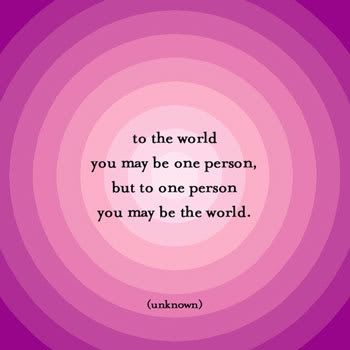Christian
Thanks darlin'
*ArTbyTreZa Bettencourt*
Thanks karina! I'm keeping this one! : )
From: SkySong LoveJoy

10 Ways to Inspire Others
by Michael AngierWe all know people who are inspiring. But just how does one inspire others? Here are ten simple ways you can inspire people to be their best:
1. Be a good example. People watch what you do more than they listen to what you say. Be someone worth emulating.
2. Care about others. People don't care about how much you know until they know how much you care. Ask questions. Take a genuine interest in people.
3. Encouragement. Everyone goes through tough times. When you support people and encourage them through these times, you'll be inspiring them to see the best in themselves and in the situation.
4. Be inspired yourself. Look for people, ideas, environments and knowledge that you find inspiring and motivating.
5. Share from your own experience. You have more to share than you realize. Mine the rich experiences of your life and share your wisdom from your unique point of view. You may be the only one who can touch someone with your inspiring message.
6. Be vulnerable. Be willing to share your failures as well as your successes. Others will relate to you. They'll understand that they're not the only ones with challenges.
7. Tell stories. Facts tell and stories sell. They inspire, too. We learn best from parables and we all need to develop our own inspiring stories.
8. Be a good communicator. Increasing your ability to communicate effectively is a critical element for you to inspire others. Watch how you speak and what you say. Invest in your communication skills.
9. Challenge people. Many of us have had teachers who at times seemed more like tormentors than mentors. They challenged us to do our best, and we were better for it. Practice "carefrontation"--the careful and caring confrontation of others.
10. Read. It may not follow that all readers are leaders, but certainly all leaders are readers. Stay informed. Share what you read with others. Tell people about books that have inspired you. Share the knowledge.
(c) successnetwork.org
Posted by
lightworkers
Reposted by
SkySonghttp://intentionalone.com/theintentionalone http://intentionalone.com/intent4knights http://intentionalone.com/community http://myspace.com/knightsintent http://myspace.com/intentionalone http://intentionalone.blogspot.com



